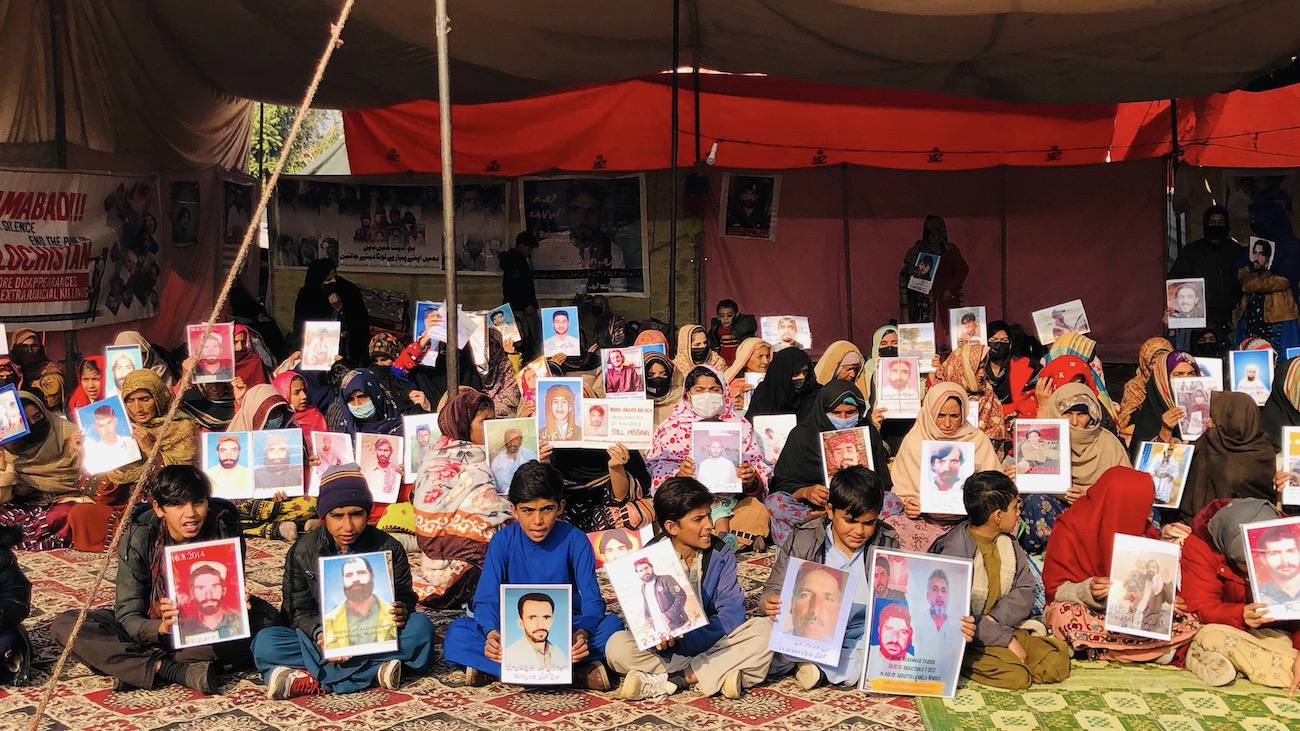In response to a call by Baloch Yakjehti (Solidarity) Committee, a shutter down strike was observed in Gwardar, Turbat, and several other districts of Balochistan on January 3. Several Baloch organizations criticized the government’s shortcoming in addressing the human rights violation in the region.
The shutdown action was in response to the state officials trying to label the Baloch long march as mere propaganda. Activists emphasized that the Baloch issue transcends the realm of counter-terrorism. “We are thankful to all traders and people who responded to our call and closed down their businesses in Balochistan,” the committee said.
For the past 43 days, sit-in protests against the extrajudicial killings, sparked by the killing of four individuals including 24-year-old Balach Mola Baksh in southern Balochistan on November 23, have continued in Islamabad. The families of dozens of disappeared persons have made a makeshift protest camp demanding an end to extrajudicial killings of Baloch people.
Day43, Short Days&long cold nights of an endless wait.The Sit-In against BalochGenocide continues, while more &more Baloch r Enforcedly Disappeared everyday from different parts of Balochistan.The #MarchAgainstBalochGenocide demands #StopBalochGenocide
“Nothing Less,Nothing More” pic.twitter.com/Kkx5z9A8h2— Baloch Yakjehti Committee (@BalochYakjehtiC) January 5, 2024
The cold weather however is worsening the health of elderly women engaged in the sit-in outside the National Press Club. “The Baloch people, facing misery, have nowhere to turn, and their voices go unheard. If harm befalls them, the state, government, and purported human rights organizations will bear responsibility for consistently harassing these women and jeopardizing their lives,” Baloch Yakjehti Committee, added.
Hundreds of Baloch women marched 1,600 kms against extrajudicial killings from the Kech district in southwestern Balochistan to the federal capital, Islamabad. They were interrupted by the Islamabad police, who baton-charged and fired water cannons on them, and detained hundreds near the National Press Club on December 20.
The participation of people who are affected by state oppression is increasing day by day in our mass movement.
Every human being is joining this mass movement with the hope that maybe the world will listen to our voice and the Baloch genocide will end.
Now, it depends on the… pic.twitter.com/GSjrsFytSP
— Mahrang Baloch (@MahrangBaloch_) January 4, 2024
On January 1, caretaker prime minister Anwaarul Haq Kakar made harsh comments against the supporters of Baloch protesters saying they should rather consider joining militant groups in Balochistan.
While talking to the media on January 1, Kakar was quoted as saying “my problem is with those trying to project the wrong interpretation of the issue and exploiting it for their ends.”
Meanwhile, the Supreme Court has ordered the government to not resort to harsh measures against the Baloch demonstrators encamped for almost two weeks outside the National Press Club, and “allow them exercise (the right to protest) to their heart’s content.” On January 2, a three-member bench led by Chief Justice of Pakistan Qazi Faez Isa heard the case against enforced disappearances and stressed for finding a viable solution to this crisis “once and for all”.
On December 28, the Baloch Yakjehti Committee had given a seven-day ultimatum to the interim federal government to start with addressing their three demands: establishing a fact-finding mission headed by a UN Working Group for a detailed investigation on rights violation in Balochistan, to repeal all the fake cases against protesters, and dissolving the Counter Terrorism Department, who the protesters say are “state-sponsored death squads”.
The protesters have complained that a number of workers showing solidarity with Baloch protesters have faced dismissal at their workplace.
“Officials of Islamabad Capital territory have even barred the volunteers from bringing blankets and other necessary items to the camp (for the protesters),” the Committee said. “Using pressure tactics will not stop the resolve of protesters who are only seeking the whereabouts of their beloved one in this harsh winter.”





